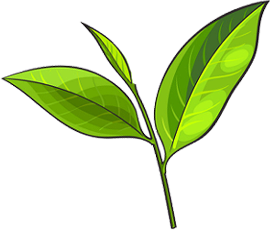India leads the world in organic black tea output. Organic tea constituted 2% of the total organic food products (26.5 m.kg) exported from India in 2015-2016. The entire production is exported to the United Kingdom, Germany, the United States, Japan and Australia. In India, the bulk of the organic tea produced originates from Darjeeling. It has been more than three decades when the first organic tea cultivation started in Darjeeling. Approximately 62 gardens out of 87 registered with the Tea Board practice organic tea cultivation in Darjeeling. All these gardens are also engaged in in-house activities to produce farm inputs such as composts, vermi compost and herbal brew to work as pesticide and herbicides. These gardens constitute about 60 percent of total average annual produce of approximately 8.5 million kgs of Darjeeling tea.The average yield of organic fields in Darjeeling ranges from 250 kg to 450 kg, which is 100?250 kg less than conventional tea fields of Darjeeling. Organic Darjeeling tea of India is now making inroads into new markets like Russia, Japan, China and the UAE.
Traditional and handmade organic teas of Assam:
After the emergence of small scale tea cultivation in Assam, the prospect of organic tea production seems to be brighter.The tea estates of Assam which have been producing teas are all non-organic. It is difficult just to make an organic tea garden because there are so many non-organic tea plantations around it. Dispersals of chemical fertilizer or pesticide and chemical agents interfused through the soil from surrounding areas can enter the organic garden. However, a few big tea gardens have converted to organic cultivation.
The small growers in Assam have the advantages of producing organic tea as they are opening tea plantations in new and/or virgin areas.Some of such small growers are making handmade teas and have found a market to suit their size. Innovative marketing and niche products, such as hand-crafted and limited editions of specialty teas, have shown an edge in the market. The same applies in South India, where organic teas are increasingly being marketed through direct factory labeled products. The platform of e-commerce is also being used to promote and market organic tea, and this medium is gaining popularity to reach out to prospective customers. The new concept of Zero-Budget Farming (ZBF) has gained popularity in India with some progressive small tea growers exploring it.
The present generation of the Singphos of Assam have succeeded in popularising the original method of tea preparation to some extent.They make tea coins of organic tea (a mixture of oolong and green tea) which has some similarity with pu’erh tea. Singpho producers are selling such teas and coins made of ‘Phalap’ (the traditional Singpho tea), even to the buyers in export market.
The handmade (handcrafted) teas produced in this way are all organic. But many of the small growers producing them prefer to call them ‘natural tea’. As most of them do not possess organic tea certification, they do not use the ‘organic’ label. Even without organic label, high quality organic production is the hallmark of these teas. These teas are mostly of black and green orthodox teas. The manufacturers prefer to call the teas ‘handcrafted tea’. The teas are mostly hand rolled or at best processed by some local indigenous tools. Out of one hundred thousand small tea growers of Assam, only a handful, some 200 have taken up both manufacturing and marketing of such handmade teas. These teas have huge marketing potential.
On the other hand, the big tea gardens which converted to organic tea are finding it difficult to find suitable markets for their teas. Supply is higher than demand, and hence there are no premiums on organic tea. These factors combined have made most of the organic gardens non-viable and sustainability is at stake. Exclusive organic tea farming does not guarantee marketing success, and the tea should be organic/ethical/food safety compliant.
While these challenges are faced by big growers practicing organic tea cultivation, the small growers do not face the above problems due to their holding size. Some of the smallholders’ gardens in the North Eastern states are naturally organic. India has converted and declared Sikkim as Organic State, and whatever crops grown there, including tea, are organic, and an area of 74190 hectares of agricultural land have been certified as organic. The State Governments of Nagaland and Mizoram have also declared their intention to go 100 percent organic in due course.
Again, contrary to popular perceptions, organic products have not fetched any premiums on prices leading to a failure of these ventures. In spite of this, some of the potential tea growing states viz., Sikkim, Himachal Pradesh and some parts of Assam and Niligiris are converting to organic tea cultivation.


 Organic tea in India
Organic tea in India